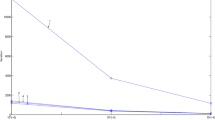Abstract
We present a framework for descent algorithms that solve the monotone variational inequality problem VIP v which consists in finding a solutionv *∈Ω v satisfyings(v *)T(v−v *)⩾0, for allv∈Ω v. This unified framework includes, as special cases, some well known iterative methods and equivalent optimization formulations. A descent method is developed for an equivalent general optimization formulation and a proof of its convergence is given. Based on this unified logarithmic framework, we show that a variant of the descent method where each subproblem is only solved approximately is globally convergent under certain conditions.
Similar content being viewed by others
References
A. Auslender,Optimisation. Méthodes Numériques (Masson, Paris, 1976).
J.F. Bard and J.E. Falk, “An explicit solution to the multi-level programming problem,”Computers and Operations Research 9 (1982) 77–100.
D.P. Bertsekas and E.M. Gafni, “Projection methods for variational inequalities with application to the traffic assignment problem,”Mathematical Progamming Study 17 (1982) 139–159.
D.P. Bertsekas and S.K. Mitter, “A descent numerical method for optimization problems with nondifferentiable cost functionals,”SIAM Journal on Control 11 (1973) 637–652.
F.H. Clarke, “Generalized gradients and applications,”Transactions of the American Mathematical Society 205 (1975) 247–262.
S. Dafermos, “Traffic equilibrium and variational inequalities,”Transportation Science 14 (1980) 42–54.
S. Dafermos, “An iterative scheme for variational inequalities,”Mathematical Programming 26 (1983) 40–47.
J.M. Danskin, “The theory of max—min with applications,”SIAM Journal on Applied Mathematics 14 (1966) 641–664.
J.-P. Dussault, J.A. Ferland and B. Lemaire, “Convex quadratic programming with one constraint and bounded variable,”Mathematical Programming 36 (1986) 90–104.
M. Florian, “Nonlinear cost network models on transportation analysis,”Mathematical Programming Study 26 (1986) 167–196.
M. Florian and M. Los, “A new look at static spatial price equilibrium model,”Regional Science and Urban Economy 12 (1982) 374–389.
M. Florian and H. Spiess, “The convergence of diagonalization algorithms for asymmetric network equilibrium problems,”Transportation Research 16B (1982) 447–483.
T.L. Friesz. “Transportation network equilibrium, design and aggregation: key developments and research opportunities,”Transportation Research 19A (1985) 413–427.
M. Fukushima, “A relaxed projection method for variational inequality,”Mathematical Programming 35 (1986) 58–70.
M. Fukushima, “Equivalent differentiable optimization problems and descent methods for asymmetric variational inequality problems,”Mathematical Programming 30 (1990) 161–220.
J.H. Hammond, “Solving asymmetric variational inequality problems and systems of equations with generalized nonlinear programming algorithms,” Ph. D. dissertation, Department of Mathematics, MIT (Cambridge, MA, 1984).
P.T. Harker, “Accelerating the convergence of the diagonalization and projection algorithms for finite-dimensional variational inequalities,”Mathematical Programming 41 (1988) 29–59.
P.T. Harker and J.S. Pang, “Finite-dimensional variational inequality and nonlinear complementarity probelms: a survey of theory, algorithms and applications,”Mathematical Programming (Series B) 48 (1990) 161–220.
N.H. Josephy, “Quasi-Newton methods for generalized equations,” Technical Report, Mathematics Research Center, University of Wisconsin (Madison, WI, 1979).
S. Kakutani, “A generalization of Brouwer's fixed point theorem,”Duke Mathematics Journal 8 (1941) 457–459.
D. Kinderlehrer and G. Stampacchia,An Introduction to Variational Inequalities and their Applications (Academic Press, New York, 1980).
P. Lancaster and Tismenetsky,The Theory of Matrices (Academic Press, New York, 1985).
P. Marcotte, “A new algorithm for solving variational inequalities, with application to the traffic assignment problem,”Mathematical Progamming 33 (1985) 339–351.
P. Marcotte and J. Guélat, “Adaptation of a modified Newton method for solving the asymmetric traffic equilibrium problem,”Transportation Science 22 (1988) 112–124.
P. Marcotte and J.-P. Dussault, “A sequential linear programming algorithm for solving monotone variational inequalities,”SIAM Journal on Control and Optimization 27 (1989) 1260–1278.
M.J. Marron,Numerical Analysis (Macmillan, New York, 1987).
B. Martos,Nonlinear Programming Theory and Methods (North-Holland, Amsterdam, 1975).
A. Migdalas, “A regularization of the Frank-Wolfe method,” LiTH-MAT-R-90-10 Department of Mathematics, Linköping Institute of Technology (Linköping, 1990).
A.B. Nagurney, “Competitive equilibrium problems, variational inequalities and regional science,”Journal of Regional Science 27 (1987) 503–517.
S. Nguyen and C. Dupuis, “An efficient method for computing traffic equilibria in networks with asymmetric transportation cost,”Transportation Science 18 (1984) 185–202.
J.M. Ortega and Rheinboldt,Iterative Solution of Nonlinear Equations in Several Variables (Academic Press, New York, 1970).
J.S. Pang and D. Chan, “Iterative methods for variational and complementary problems,”Mathematical Programming 24 (1982) 284–313.
J.S. Pang and C.S. Yu, “Linearized simplicial decomposition methods for computing traffic equilibria on networks,”Networks 14 (1984) 427–438.
J.S. Pang, “Newton's method for B-differentiable equations,”Mathematics of Operations Research 15 (1990) 311–341.
M.J. Smith, “Existence, uniqueness and stability of traffic equilibria,”Transportation Research 13B (1979) 295–304.
M.J. Smith, “The existence and calculation of traffic equilibria,”Transportation Research 17B (1983) 291–303.
G.W. Stewart,Introduction to Matrix Computations (Academic Press, New York, 1973).
J.H. Wu, M. Florian and P. Marcotte, “A new optimization formulation of the variational inequality with application to the traffic equilibrium,” Publication 722, Centre de recherche sur les transports, Université de Montréal (Montréal, Qué., 1990).
J.H. Wu, M. Florian and P. Marcotte, “Transit equilibrium assignment: a model and solution algorithm,” Publication 721, Center de recherche sur les transports, Université de Montréal (Montréal, Qué., 1991), to appear in:Transportation Science.
W.I. Zangwill,Nonlinear Programming (Prentice-Hall, Englewood Cliffs, NJ, 1967).
Author information
Authors and Affiliations
Additional information
This research was supported in part by individual operating grants from NSERC.
Rights and permissions
About this article
Cite this article
Wu, J.H., Florian, M. & Marcotte, P. A general descent framework for the monotone variational inequality problem. Mathematical Programming 61, 281–300 (1993). https://doi.org/10.1007/BF01582152
Received:
Revised:
Issue Date:
DOI: https://doi.org/10.1007/BF01582152



